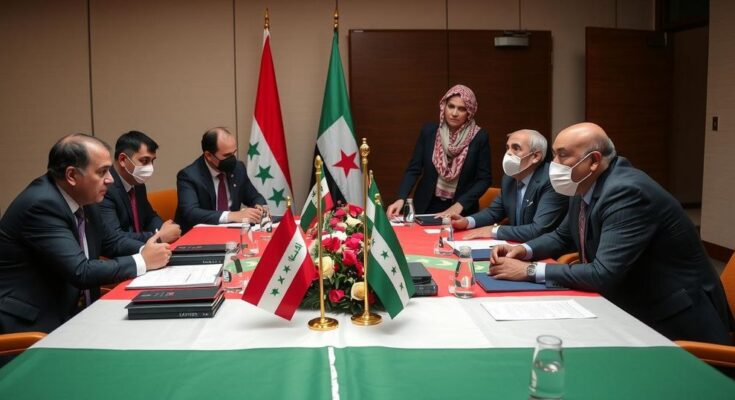President Abdel Fattah Al-Sisi of Egypt has stressed the importance of Syria’s unity and political inclusivity amidst ongoing international dialogues involving Turkey and various Syrian representatives, calling for transitional justice and reconstruction efforts inclusive of all citizens. Meanwhile, France has cautiously re-engaged diplomatically with Syria, emphasizing a need for a credible political transition.
Egyptian President Abdel Fattah Al-Sisi has underscored the critical need for maintaining Syria’s unity and territorial integrity during a recent conversation with Cypriot leader Nikos Christodoulides. Al-Sisi articulated that a comprehensive political process must engage all factions within Syria for sustainable peace. Meanwhile, Turkish President Recep Tayyip Erdoğan called for global collaboration on Syria’s reconstruction, stressing Turkey’s efforts to combat perceived terrorist threats that contribute to ongoing regional instability. Erdoğan reiterated Turkey’s commitment to safeguarding its national security while addressing the Kurdish militia groups that pose significant challenges in Northern Syria.
Amidst these discussions, Bader Jamous of the Syrian Negotiation Commission emphasized the imperative for transitional justice in Syria, declaring it a necessity rather than an option. He underscored the significance of pursuing legal accountability for the former regime, citing the framework established by UN Security Council Resolution 2254 as a guiding roadmap for fulfilling the aspirations of the Syrian populace. Jamous also advocated for forming a national transitional government inclusive of all demographics and called for organizing free elections under UN supervision.
The international community weighs heavily on Syrian affairs, with Russian representatives urging the maintenance of state institutions, even amidst conflicts in close proximity to Damascus. Furthermore, UN envoy Geir Pedersen highlighted the necessity for a viable political transition to secure the economic assistance the country desperately requires, reiterating that the humanitarian crisis remains acute, with ongoing needs for basic supplies.
In a notable diplomatic move, France has re-engaged with Syria by sending a diplomatic mission to assess the evolving political landscape and emphasizing the need for an inclusive approach to the political transition. This mission coincides with the symbolic raising of the French flag at their embassy in Damascus, marking a cautious step towards restoring diplomatic relations after years of detachment following the civil war.
The geopolitical landscape in Syria remains precarious in the aftermath of the civil war, which saw the previous regime under Bashar Al-Assad being challenged by various factions. The international community, particularly nations like Egypt and Turkey, are voicing their perspectives on Syria’s path forward, advocating for unity and political processes that encompass diverse Syrian constituencies. Simultaneously, uncertainties involving regional security and humanitarian crises demand urgent international focus, as millions of Syrians continue to face dire conditions. Recent engagements by countries such as France signify a shifting approach towards diplomatic efforts in navigating Syria’s multifaceted conflicts.
In summary, the emphasis on Syria’s territorial integrity and the call for inclusive political dialogue reflects international recognition of the complexities surrounding the nation’s recovery. Leaders like Al-Sisi and Erdoğan advocate for stability through cooperation while pressing for justice and governance reforms as articulated by the Syrian Negotiation Commission. The renewed engagement from global powers such as France further indicates a potential shift towards constructive diplomacy aimed at addressing the lingering crises that continue to afflict the Syrian people.
Original Source: www.dailynewsegypt.com




